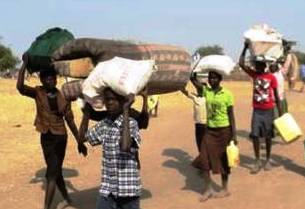Churches and agencies are working with the Anglican Alliance to support the Episcopal Church of Sudan and South Sudan after conflict has left more than 400,000 people displaced and killed up to 10,000. The local church is providing practical support to the thousands across the country who have been left without food, water or shelter.
The Anglican Alliance have been working hard to help coordinate Anglican churches and agencies to support those suffering in South Sudan.
Local churches are taking the lead in the humanitarian response as they remain at the heart of their communities, in places that international agencies cannot reach.
An emergency UK Working Group meeting was held on 8th January, to link international organisations in the response to the crisis.
A coordinated humanitarian response is being developed by the Alliance with local churches and Anglican partners around the world. The consolidated proposal is expected in a few days and will be posted on the Anglican Alliance’s website.
Anglican churches and agencies are coming together to appeal for prayers and support for those affected by the crisis. Follow these links to see their reports and appeals:
Episcopal Relief & Development
Primates World Relief and Development Fund
More than 400,000 people have been displaced and up to 10,000 have been killed in violence that has swept through the country since December.
Most Revd Daniel Deng Bul, Archbishop of the Episcopal Church of South Sudan and Sudan (ECSS&S), has been on the frontline responding to the disaster. In a recent letter to the Archbishop of Canterbury he asked for the help of Anglicans around the world as they worked to provide shelter and support to those who needed it most.
The Province has set up an Emergency Crisis Committee which is working with SUDRA, the Church’s local Relief and Rehabilitation Agency, to consolidate a proposal for the humanitarian response in the affected dioceses.
Priorities for the relief response have been identified as SUDRA develops its proposal for the Church’s humanitarian response, working with the Emergency Crisis Committee, set up by Archbishop Daniel Deng Bul.
Awerial is among the top priorities for the response. Just outside of Bor, the town received an influx of 76,000 people when fighting started in December. There is little food, water and shelter, and families are struggling to survive. Nine relief centres have already been set up by ECSS&S, to provide supplies and pastoral care to those taking refuge in the town. The Church is also looking after those who have sought refuge in church compounds in Juba and elsewhere.
Nimule is on the border with Uganda, and no agencies can work there. Over 3000 people are currently crossing the border into Uganda every day and 80 per cent of these are children (UN figures, 10 January 2014). Nimule is another top priority area for SUDRA, whose relief efforts through the local church will reach those who are beyond the reach of others.
More on the Anglican Alliance’s response and the work of agencies worldwide is featured in this e-newsletter.
In the picture: Some of the 76,000 people arriving in Awerial after fighting broke out in Bor.

